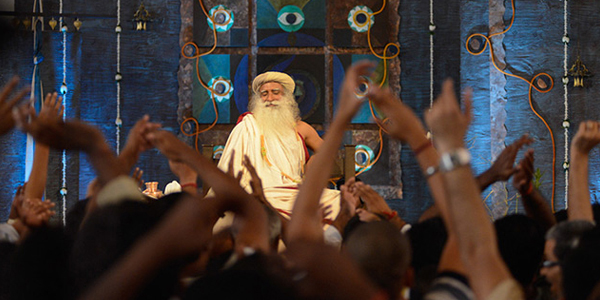Why We Need to Realize We Are Life

“We have lost contact with life – our own life, and everything else that nourishes our life.” —Sadhguru
Unfortunately, we are still looking at a mega problem in small pieces. That’s how it works in the world – we are focusing on one thing at a time. Plastic is not a separate problem. Essentially, the problem is about the way we live. We as life have forgotten that we are life. We have forgotten that our life’s existence is connected to everything around us. People say nearly seven kilograms of intake exchanges are happening per day. We have lost contact with life – our own life, and everything else that nourishes our life. This is the fundamental disaster which is manifesting in so many different ways in the world.
In our country, the condition of the land, the soil, and the water is very alarming. With 1.3 billion people, allowing soil and water to get depleted like this means we still have not taken the nation in our hands. With the Rally for Rivers, we picked water to start with. Now plastic has been the theme of the United Nations, and it is a very deep concern. Plastic is a classic case of who we are right now, how irresponsible we are. Of many materials that we have developed on this planet, plastic is one of the most fantastic ones. It can be recycled over and over again if we handle it right. But we have handled it so irresponsibly that it has become poisonous, and it has entered everything. They are saying a whole lot of microbes are carrying plastic in them.
It is not time to debate. It is time to act. Though there are so many wonderful people who will immediately respond, I don’t believe the larger population will correct things by themselves. They need the push of law. That is why we are looking at single-use plastic ban.
It’s only in the last twenty years that this has happened. Earlier, we never really used plastic like that in this country. If once in a way, a plastic cover came home, my mother would fold it for future use, and we would use for two, three years. It’s not so difficult to live as we were living at that time. Whatever small things we as individuals can do are important to express our commitment. But the problem is bigger. The solution also needs to be approached as such.
Right now, nearly forty percent of plastic is in packaging. This is the area that we need to address, because this is one thing that can be easily avoided. Water bottles are about eight to nine percent of the plastics used in the world. We are manufacturing nearly half a trillion bottles every year. I have been in conversation with some of the largest PET-bottle manufacturers in the world. They are all willing to change right now. We want the governments to push it.
The industry themselves have realized they have to do this for their own survival. Now these companies, in collaboration with universities from the Netherlands and a few marketing companies, are trying to make PET a continuous recycling process. That means the same bottles could be used and reused almost forever. Changing lifestyles is important. But we are talking about 7.6 billion people. Changing all their lifestyles is going to be a long-term plan. And by the time you change one generation, the next generation has gotten up and is doing something else. We need to bring a law that recycling must happen.
One important point is there are many grades of plastic. Some of them are completely non-recyclable – they must be banned absolutely. Among the recyclable plastics, there are so many varieties. In the United States, we have formed a powerful group of people who are approaching major industry with solutions. For example, Coke bottles would be easily recyclable, but because of the paper label on it, you cannot recycle. If you recycle with the paper label, it gets downgraded – it would not be food-grade plastic. If the label was of the same grade plastic as the bottle, then it would be easy to recycle. We are also talking to companies who are capable of printing on the bottle.
We want to go to the businesses with solutions – not protesting against them, not trying to destroy businesses. The economic concerns of a business and the economic concerns of a nation are important. Unfortunately, so far, it has always been economy versus ecology. This is what we have changed with the Rally for Rivers. Suppose there is a fight between ecology and economy, what do you think will win in your home, in your community, in your country? Economy, of course. People are thinking economy is today’s concern, ecology is tomorrow’s concern. No – ecology is today’s concern.
We have to transform those businesses which are the major factors of pollution to a more ecologically sensitive way of operation. This has to be looked at on all levels. You can’t just tell a local vendor, “You can’t use plastic.” What is he supposed to use? We must go and tell him what he can use as an alternate product, how he can use it, and how it is more beneficial for him and the customer. These things have to be brought about, rather than simply protesting against business and industry, because on the long run, that’s not going to work – economy will win. If we want ecology to win, we have to marry ecology and economy. This is my effort.
Love & Grace
Sadhguru
Watch the complete conversation here:
World Environment Day – Erik Solheim and Dia Mirza in conversation with Sadhguru


